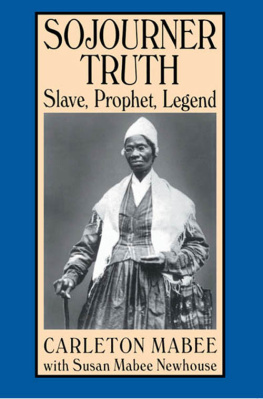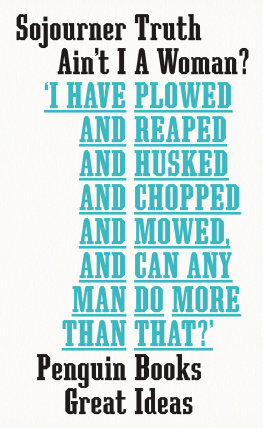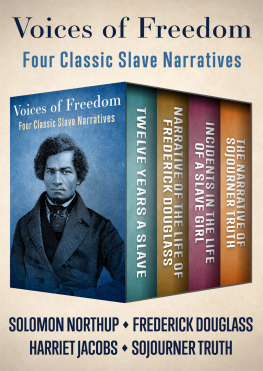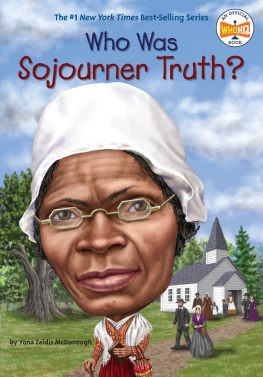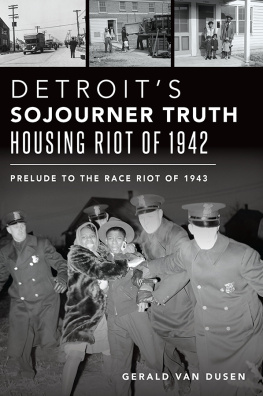Thank you for buying this ebook, published by NYU Press.
Sign up for our e-newsletters to receive information about forthcoming books, special discounts, and more!
Sign Up!
About NYU Press
A publisher of original scholarship since its founding in 1916, New York University Press Produces more than 100 new books each year, with a backlist of 3,000 titles in print. Working across the humanities and social sciences, NYU Press has award-winning lists in sociology, law, cultural and American studies, religion, American history, anthropology, politics, criminology, media and communication, literary studies, and psychology.
SOJOURNER TRUTH
ALSO BY CARLETON MABEE
The American Leonardo: A Life of Samuel F. B. Morse
(PULITZER PRIZE)
Black Education in New York State: From Colonial to Modern Times
(JOHN BEN SNOW PRIZE)
Black Freedom: The Nonviolent Abolitionists from 1830 through the Civil War
(ANISFIELD-WOLF AWARD)
A Quaker Speaks from the Black Experience: The Life and Selected Writings of
Barrington Dunbar
(WITH JAMES A. FLETCHER)
The Seaway Story
New York University Press
New York and London
Copyright 1993, 1995 by New York University
All rights reserved
Library of Congress Cataloging-in-Publication Data
Mabee, Carleton, 1914
Sojourner Truthslave, prophet, legend / by Carleton Mabee, with
Susan Mabee Newhouse.
p. cm.
Includes bibliographical references and index.
ISBN 0-8147-5484-8 ISBN 0-8147-5525-9 pbk.
1. Truth, Sojourner, d. 1883. 2. Afro-AmericansBiography.
3. AbolitionistsUnited StatesBiography. 4. Social reformers
United StatesBiography. I. Newhouse, Susan Mabee. II. Title.
E185.97.T8M32 1993
305.567092dc2o
[B] 93-9370
CIP
New York University Press books are printed on acid-free paper,
and their binding materials are chosen for strength and durability.
Manufactured in the United States of America
10 9 8 7 6 5 4 3
Preface
Sojourner Truth was born and grew up a slave in New York State. As a slave, she was called Isabella. It was only long after she was freed that she adopted the name of Sojourner Truth. Under her new name, in the period before and after the Civil War, she became a national figure in the struggle for the liberation of both blacks and women.
Drawing on her faith in God, Truth acted courageously against the folly and injustice of her time. Despite her poverty and illiteracy, despite being black in a predominantly white society, despite the customary pressure at that time for women to remain passive, she significantly shaped both her own life and the struggle for human rights. She became in her time and ours an inspiration to women, to blacks, to the poor, and to the religious.
Myths often grew up about Truth. Because she was so colorful, and because so little precise information about her has been available, persons with causes to promote have often found it easy to mythologize her. Over time, the various myths have served a variety of changing needs, needs that were often psychological or political.
Much that was written about Truth in her time and ours has been written without stating sources, which has encouraged mythmaking. Several of her twentieth-century biographers have invented conversation for her, without making clear to readers that they were doing so, which added to the myths. Even her own story of her life as published in her Narrative, first in 1850 and later in revisions, should be used cautiously. The first version was based on her recollections when she was already about fifty-three years old, and was supported by few written records. Moreover, because Truth was illiterate, her Narrative was written down by friends who interpreted her life to some degree in terms of their own interests and experience.
Perhaps some of the myths about Truth have served positive functions, up to a point. But they have also contributed, I believe, to distortions about American history, particularly about the history of blacks and women. Surely anyone who chose for herself the name of Truth, withshe believedthe help of God, would understand any effort to push the myths aside to discover the truth about her life.
I believe this book to be the first biography of Truth ever published that has been seriously concerned to discover the best available sources about her, to stay close to those sources, and to state what they are. Because the sources remain limited, portions of her story necessarily remain elusive. Recognizing that limitation, I have tried to tell the story of her life as directly as the most original and reliable available sources permit. Writing for the general reader, I have tried to avoid academic jargon. Writing for the long-term, I have tried to avoid currently chic or political interpretation.
The hunt for original sources on Truth has led me on a six-year search scouring old records, including manuscripts and local newspapers. It has led me to prowl where Truth lived or worked or travelled as a speaker, as from New York to Washington, DC, from Northampton to Rochester and Akron, from Battle Creek to Chicago and Topeka. With the aid of librarians, archivists, and devotees of Truth, I have located documents that give us significant new knowledge, as about her puzzling relation to her children, why she never learned to read, the authenticity of famous quotations attributed to her (such as Arnt I a woman? and Is God Dead?), why she moved from Massachusetts to Michigan, her relation to President Lincoln, her moving freed slaves from the South to the North, her policy on racial separatism, her role as a singer, and her participation in spiritualism. I hope this book encourages reassessment of the enigmatic Sojourner Truth and her place in American history.
In reporting what Truth said, some recent writers, in the understandable effort to avoid the nineteenth-century tendency to report blacks as speaking in an exaggerated, stereotyped black dialect, have freely translated her words into more standard English. However, this may remove us still further from her own peculiar style of speech, which was an ingredient of her charm. Although the original sources may be inadequate in conveying her language, they are nevertheless the best we have. Therefore, although occasionally I have altered punctuation for readability, my policy has been to preserve as much as possible the words that Truth was originally reported as saying.
I have felt encouraged to write about Sojourner Truth because I live in Ulster County, in the mid-Hudson River Valley of New York State, where she was born and grew up as a slave. I know the same essential landscape that she knew, including the grandeur of the Hudson River to the east and the sweep of hills toward the Catskill Mountains to the west. In this region, the State University of New York, College at New Paltzof which I have long been a parthas named its library, the Sojourner Truth Library, in her honor, and has long been collecting materials about her. There are people connected with the library and other nearby libraries, historical societies, and townssuch as New Paltz, Hurley, Esopus, and Kingston where she lived as a slavewho have been eager to discover more about her life. I wish to thank them for their help and encouragement, especially Corinne Nyquist and Jean Sauer (Sojourner Truth Library), Harriett Straus (New York Supreme Court Library, Kingston), Dorothy Dumond (Town Historian, Esopus), and Kenneth E. Hasbrouck (Huguenot Historical Society, New Paltz). I wish to thank my colleagues for hints and criticism, particularly Albert J. Williams-Myers, Donald Roper, Margaret Wade, and Evelyn Acomb Walker. I wish to thank correspondents, archivists, and librarians everywhere for preserving materials about her and making suggestions, particularly Mary Wolfskill (Library of Congress), Marlene Steele (Willard Library, Battle Creek, MI), Ruth E. Wilbur (Northampton, MA, Historical Society), Betty Gubert, Nashormeh Lindo, and Ernest Kaiser (Schomburg Center, New York Public Library). I also wish to thank many others for information or stimulation, and regret I can name only a few, including William Gibbons (New York), Kathryn Weiss (Gardiner, NY), Wendell Tripp (Editor,

